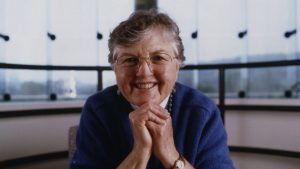Although not a household name, Frances Allen has directly and indirectly shaped the computing world as we know it. The first woman to receive the illustrious Turing Award, Allen passed away August 4, 2020, on her 88th birthday at a nursing home in Schenectady, New York. She was also the first woman appointed to the position of IBM Fellow, the highest honor a scientist or engineer can achieve from the computing giant.
Frances Allen was a native of upstate New York, her roots laid in the small rural town of Peru. She first obtained a bachelor’s degree in mathematics from The New York State College of Teachers, initially pursuing a career in education. Soon afterwards, she set her sights on the University of Michigan in Ann Arbor, where she graduated with a master’s in mathematics in 1957, then quickly sought employment at IBM Research in Poughkeepsie, NY. She planned to return to teaching after paying off her large student loan debt. However, her job as a programmer turned into a fruitful 45-year career.
Allen’s calling to computer science began with a collaboration in code-breaking with the National Security Agency, where she helped build the programming language and compilers for the Stretch-Harvest government supercomputer. Compilers, the programs that translate computer languages between source and target, were terribly slow and inefficient until Allen and others at IBM sought to bridge the gap between software and hardware. Alongside fellow computer science trailblazer John Cocke, she wrote a series of formative papers on optimizing compilers, including “A Catalog of Optimizing Transformations.” Her work in the 1960s also included innovating “parallel computing,” maximizing efficiency by sharing processes across multiple mainframes. The seeds she planted grew into modern computer programming, eventually leading to a world where smartphones can access applications at a touch while information travels at lightning speeds between thousands of computers and data centers.
In addition to transforming the technological ecosystem of computer science, Allen paved the way for women in the field. Her experimental compiler group in IBM was staffed largely by female programmers, and in 1989, she became the first female IBM fellow. In 2002, Allen received the Augusta Ada Lovelace Award for her achievement and service on behalf of women in computing.
























